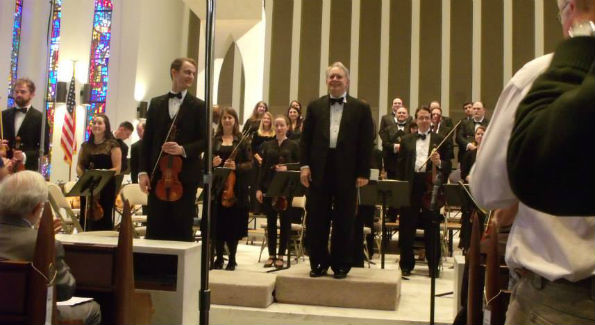REVIEW: The Washington Bach Consort takes a welcomed detour with Mozart’s ‘Requiem’ for season opener.
By Patrick D. McCoy

Conductor J. Reilly Lewis (center) and the Washington Bach Consort at the end of their all Mozart opener. (Photo by Patrick D. McCoy)
The Washington Bach Consort truly showed their versatility in their season opening performance of Mozart’s ‘Requiem.’ Due to the group’s namesake, Baroque composer Johann Sebastian Bach, some might not expect that the group founded 36 years ago by J. Reilly Lewis would venture very far from Bach’s masterpieces. Yet lately, the consort has been exploring the music of other composers such as Benjamin Britten along with more contemporary composers. This performance of ‘Requiem’ was the perfect vehicle for the group, which, for the most part, is a specialized ensemble focused on the music of a specific composer. Under Lewis’ skillful direction, the consort singers and orchestra revealed a welcomed new dimension to their performance. The singers and instrumentalists alike seemed to dig a little deeper into their core sound, a unique contrast to the tonal restraint often required for music of the Baroque period.
Mozart’s ‘Regina Coeli’ for the chorus, soloists and orchestra opened the first half of the concert. From the opening chord, the singers burst forth with joy, with intermittent quartet singing throughout by soloists Laura Choi Stuart, Kristen Dubenion-Smith, Nicholas Fichter and bass Jon Bruno. The glorious hymn to the Virgin culminated with consort voices ascending heavenward on the word “alleluja.” Two hallmark pieces of Mozart’s sacred output rounded out the first half of the concert. Guest soloist, soprano Sherazade Panthaki joined the consort instrumentalists for the vocal showpiece ‘Exsultate jubilate.’ Panthaki’s voice was radiant and clear throughout. There was noticeably more depth to her sound, in contrast to other soloists whom have sung music of earlier periods with the consort. Her voice was well suited for the moving lines of Mozart’s vocal gem. Along with the sensitive playing by the orchestra and Lewis’ buoyant conducting, the preceding recitatives of the work were the perfect setup for the popular ‘Alleluja’ movement. Here especially the soprano’s vocal virtuosity was on full display. Ending triumphantly on a high C, the bravura performance by the soprano was rewarded with hearty applause. ‘Ave Verum Corpus’ almost made time stand still, as the singers sang the solemn motet with a delicate, pure tone that drew in the listener. That short moment was one of musical ecstasy that one could only hope to continue.
It was in the second half of the performance that the audience got to hear a different palette of sound from the consort. Mozart’s classical writing requires a bit more heft, both vocally and instrumentally, than most. Neither fell short, as the composer’s immortal ‘Requiem’ was performed with such rich nuances by the ensemble. From the softer, rounded sound of the opening ‘Kyrie’ to the glorious full-throated singing of the ‘Rex tremendae,’ there was never a dull moment in the performance. The ‘Recordare’ was the perfect vehicle for the accomplished soloists to not only display their individual abilities,but to also sing together, which they did masterfully. Then, there were the big, awe-filled moments, such as the expansive ‘Sanctus’ followed by the fugal movement on the word “osanna.” One of the most lyrical moments of the consort’s singing was in the rendering of ‘Hostias,’ opening with a long, smooth vocal line, followed by more movement in the second half. Bringing the work to its close was the ‘Lux Aeterna,’ a recap of the soprano’s musical material from the opening ‘Kyrie.’
Recently named among the Forty Under 40 for his contributions to arts and humanities, Patrick D. McCoy received a B.M. in vocal performance from Virginia State University and a M.M. in church music from the Shenandoah Conservatory in Winchester, Va. , where he serves on the alumni board of directors. He has contributed arts and culture pieces to CBS Washington, The Afro-American Newspaper and the newly published book, “In Spite of the Drawbacks” (Association of Black Women Historians), which includes his chapter on legendary soprano Leontyne Price. McCoy has interviewed some of the most acclaimed artists of our time, including Renée Fleming, Joshua Bell, Martina Arroyo, Denyce Graves, Eric Owens, Norman Scribner, Julian Wachner, Christine Brewer and Lawrence Brownlee. He is music director at Trinity Episcopal Church, DC. Listen to these interviews and others at Blog Talk Radio. Additionally, he is a member of the Music Critics Association of North America. McCoy may be reached via email at wlperformingarts@aol.com and on Twitter @PatrickDMcCoy.




